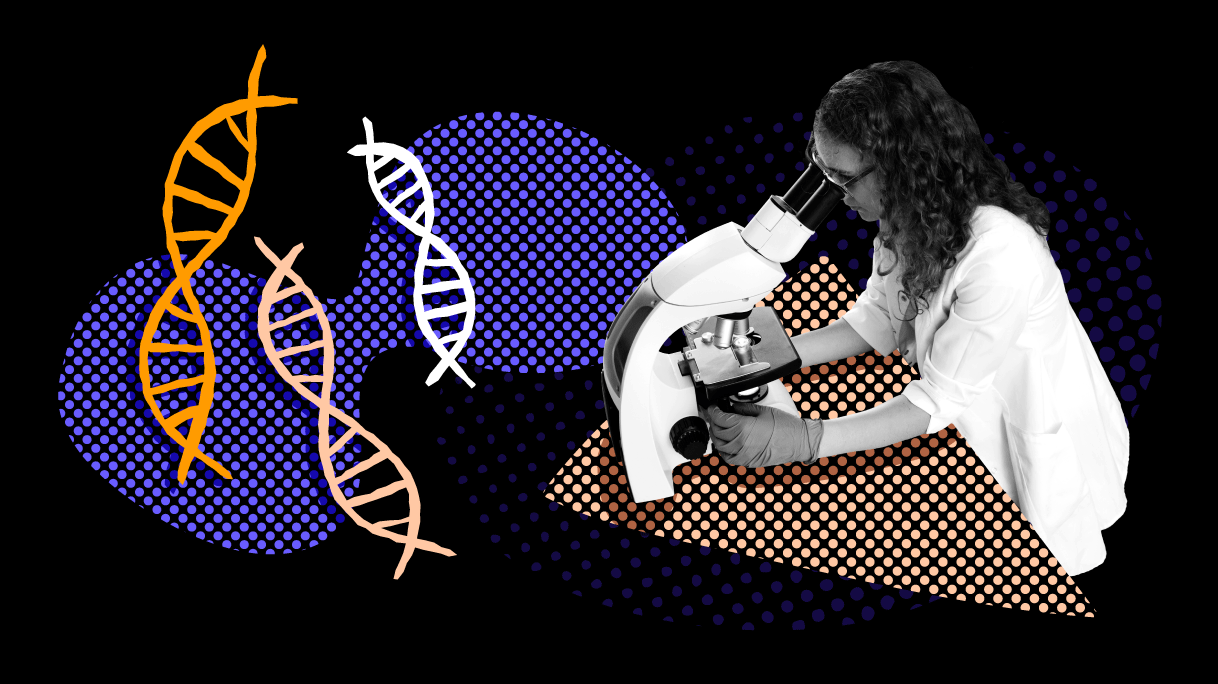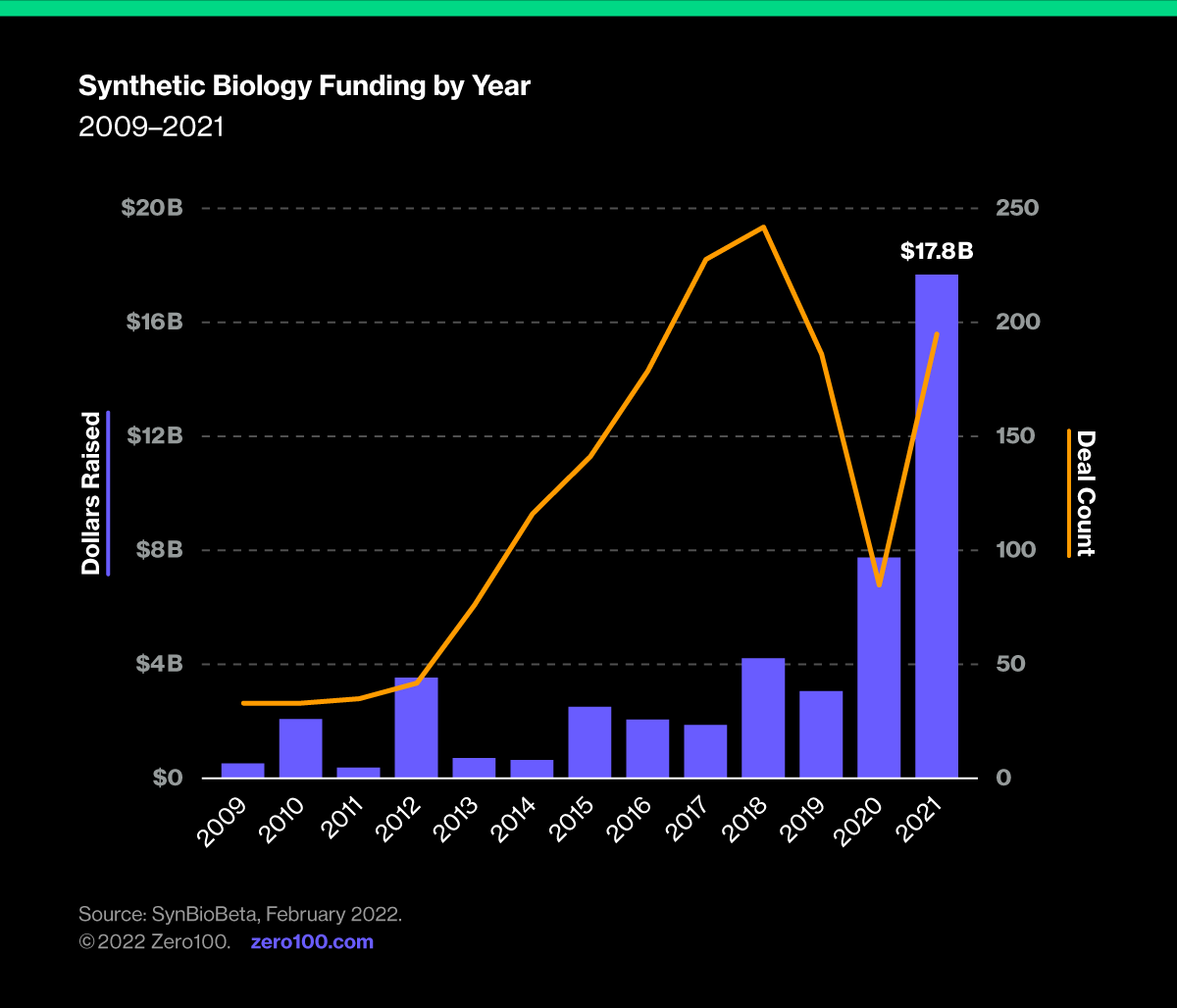
SynBio Radically Reinvents Supply Chain
Synthetic biology in supply chain management ties back to source and make functions. Building on digital technology, artificial intelligence and simulation modelling, synbio makes strides in decarbonization.
Supply chain strategy season is well underway and as much as we'd like to be bullish about a return to growth, it's hard not to worry about everything from energy in Europe to a debt crisis in China. “Hardening” and resilient supply chains are all the rage now, but if you're looking for something ambitious and exciting to include in your long-term strategic plan, check out synthetic biology.
Synthetic biology (a.k.a. synbio) is a radically new way to think about manufacturing and materials that could be smarter, cleaner, and less dependent on the increasingly dubious network of oil-and-cheap-labor trading partners we still rely on far too much. Plus, it's the kind of breakthrough thinking that business leaders expect supply chains strategists to be on top of.
What Is SynBio?
According to the World Economic Forum “synthetic biology is the engineering and redesign of biological systems that do not already exist in nature, but which could have a range of applications in everything from therapeutics to conservation to manufacturing.” Mechanically, it boils down to tinkering with DNA to engineer and produce new biological resources, and it uses powerful data analytics to speed things up.
Its relevance to supply chain management ties back to two of the most fundamental jobs we do: source and make. It has already been applied to food (Impossible Foods), packaging (Apeel Sciences), fragrances (Evolva with International Flavors & Fragrances), and fabric (Bolt Threads), as well as many more obvious uses in biotech and healthcare. It is also a booming startup sector attracting lots of new money and talent.

Where Does SynBio Fit in Supply Chain Strategy?
I had a chat this week with Hussain Mooraj, a Deloitte Senior Partner and leader of the firm's NextGen Therapy Practice. The conversation was meant to get at cool, potentially disruptive technologies on the path to zero carbon, 100% digital supply chains. I ended up getting a crash course in synbio and seeing links to practically every supply chain strategy discussion I've been part of for the last six months.
Synbio sits right in the middle of the Zero100 Lens which keeps our research and community focused on three overlapping areas of coverage: digital, ESG and people. Its builds on digital technology, especially artificial intelligence and simulation modelling, promises big strides in decarbonization by moving away from hydrocarbon-based resources, and leverages scientific talent beyond the lab and into the factory.
For food & beverage companies it's part of a regenerative agriculture strategy. For CPG companies it's part of a move toward sustainable alternatives to plastic packaging. For apparel and footwear, it's a way to rethink labor-intensive manufacturing with materials science breakthroughs. For chemical companies it's a new kind of feedstock and a different approach to molecule design.
For supply chain strategists, synbio represents a whole new way to think about sourcing and production that breaks the 100-year-old habit of approaching manufacturing in terms of bills-of-materials. Neri Oxman, an architect cum materials scientist based out of MIT's Media Lab, crystallizes this mind shift as a design tenet: “Growth over Assembly” – saying of her philosophy, “In contrast to industrial production and the logic of assembly lines, Nature grows things.” Which, by the way, also means “growing” things where you need them instead of shipping them thousands of miles around the planet. Very cool.
To be clear though, synbio belongs in the “stretch” section of your strategic plan. McKinsey projects $3-5 trillion in economic impact, but even their “medium” time horizon is 2030-2040. Don't overpromise on this one.
How Does SynBio Get Us to Zero Carbon?
A sourcing and manufacturing infrastructure based on engineered biological processes won't apply everywhere – automotive, industrial, and aerospace sectors may never be part of this story. But for those industries where organic materials dominate the ingredient list, including agriculture, CPG, pharmaceuticals, apparel, parts of construction, and even energy, the prospect of working with nature regeneratively is well worth investigating.
Making it happen at scale won't be easy. The Schmidt Futures Bioeconomy Task Force recently published a report calling for US government support similar to that provided for semiconductors. They hope to “transform manufacturing processes to use renewable biomass rather than petroleum to make the products of modern society” and be net zero by 2050.
Think Big. Think Bio.
Supply chain strategists seeking big ideas offering growth, resilience, and a path to zero carbon should look at synbio now. It isn't going to change your world tomorrow, but it certainly could reinvent the way you source, manufacture, and regenerate supply chains in the not-too-distant future.
Critical Reading
THE NEW YORKER
Commentary: On display at the Biofabricate Summit in Brooklyn in August were a variety of the latest eco-friendly materials including, algae inks, crustacean superglue and yarn derived from squid ink DNA.
#eco #materials
GREENBIZ
Bridgestone Invests $42M More to Turn Desert Shrubs into Rubber Alternative
Commentary: As part of its effort to deliver 100% renewable tires by 2050, Bridgestone Americas has invested over $100 million into the commercialization of guayule – a desert shrub found in the southwest which can be used as a source of natural rubber for its tires.
#renewable #sourcing
THE WALL STREET JOURNAL
Rivian, Mercedes to Partner on Electric-Van Factory
Commentary: Mercedes-Benz group has entered a joint venture with electric vehicle automaker Rivian to invest in and operate a factory in Europe. The factory will produce large electric vans that are optimized for efficient production on common assembly lines at the plant.
#electric #delivery